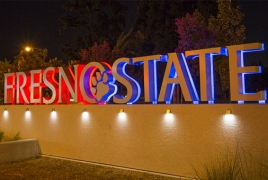Turkish scholar details where Armenian Genocide began February 7, 2018 - 15:49 AMT PanARMENIAN.Net - During the spring lecture series Tuesday, February 6 night, Dr. Yektan Türkyılmaz presented his first lecture for the Armenian Studies Program in which he detailed the development and downfall of Van Vaspurakan Armenians leading to the Armenian Genocide, The Collegian says. Türkyilmaz is a Turkish scholar of Kurdish origin associated with Duke University. Türkyılmaz said he wanted to challenge the conventional understanding of history in regard to Van Vaspurakan Armenians. Instead of focusing solely on violence, he highlighted Van as a city full of art, architecture, heroism and resistance. “I tried to offer an authentic interpretation to the history and memory of Van Vaspurakan in which Armenians are always active agents,” Türkyılmaz said. Türkyılmaz’s lecture, “Van Vaspurakan Armenians: From Renaissance to Resistance and Genocide,” was his first lecture as part of the Henry S. Khanzadian Kazan visiting professor endowment. The endowment allows an internationally-recognized scholar in Armenian studies to teach a modern Armenian history course at Fresno State and present three lectures at the university. “[Van] Vaspurakan was and has been a social, cultural, intellectual and economic network that connected three empires – Ottoman, Russian and Persian,” Türkyılmaz said. The interconnectedness allowed the modernization of Van Vaspurakan in the 19th century, Türkyılmaz said, which included the arrival of missionaries and the construction of schools for boys and girls. “The region prospered significantly thanks to leather and furnishing industries and their trade,” he said. “The same period also witnessed the in-pouring of social activists, such as missionaries and foreign consulates.” Türkyılmaz said that the city of Van Vaspurakan was not a passive recipient of these new ideas, but rather inspired all major Armenian culture political centers and locations elsewhere. This intellectual transformation would lead to early pioneering of Armenian nationalist organizations, including the Armenakan party and the Armenian Revolutionary Federation, among others, Türkyılmaz said. Growing tensions along the fault line of Russian southern caucasus and northern Iran to Istanbul to Van Vaspurakan were contributing factors to the genocide, according to Türkyılmaz. “Van [Vaspurakan] is the first place in the empire that intercommunal coexistence entirely and violently collapsed,” he said. “Van [Vaspurakan] was the epicenter of the Armenian Genocide, the place where it incubated.” Türkyılmaz describes the Armenians of Van Vaspurakan as “victims who rejected victimhood” and remained connected through tribal networks, revolutionary activism, smuggling and business despite borders and governmental terrorism. “The Armenian defense of Van [Vaspurakan] in April 1915 serves as a rare [example] that a community under existential trek amalgamated and intra-communal diversity blurred,” Türkyılmaz said. Six total incidents have burned 19 old-growth trees. Friday night 8 trees were torched along the beautiful main entrance. The EU does not intend to conduct military exercises with Armenia, Lead Spokesperson for EU Foreign Affairs and Security Policy Peter Stano says. Hikmet Hajiyev has said that there is no place for USAID operation in Azerbaijan any longer. A telephone conversation between Putin and Pashinyan before the CSTO summit is not planned, Peskov says. Partner news |